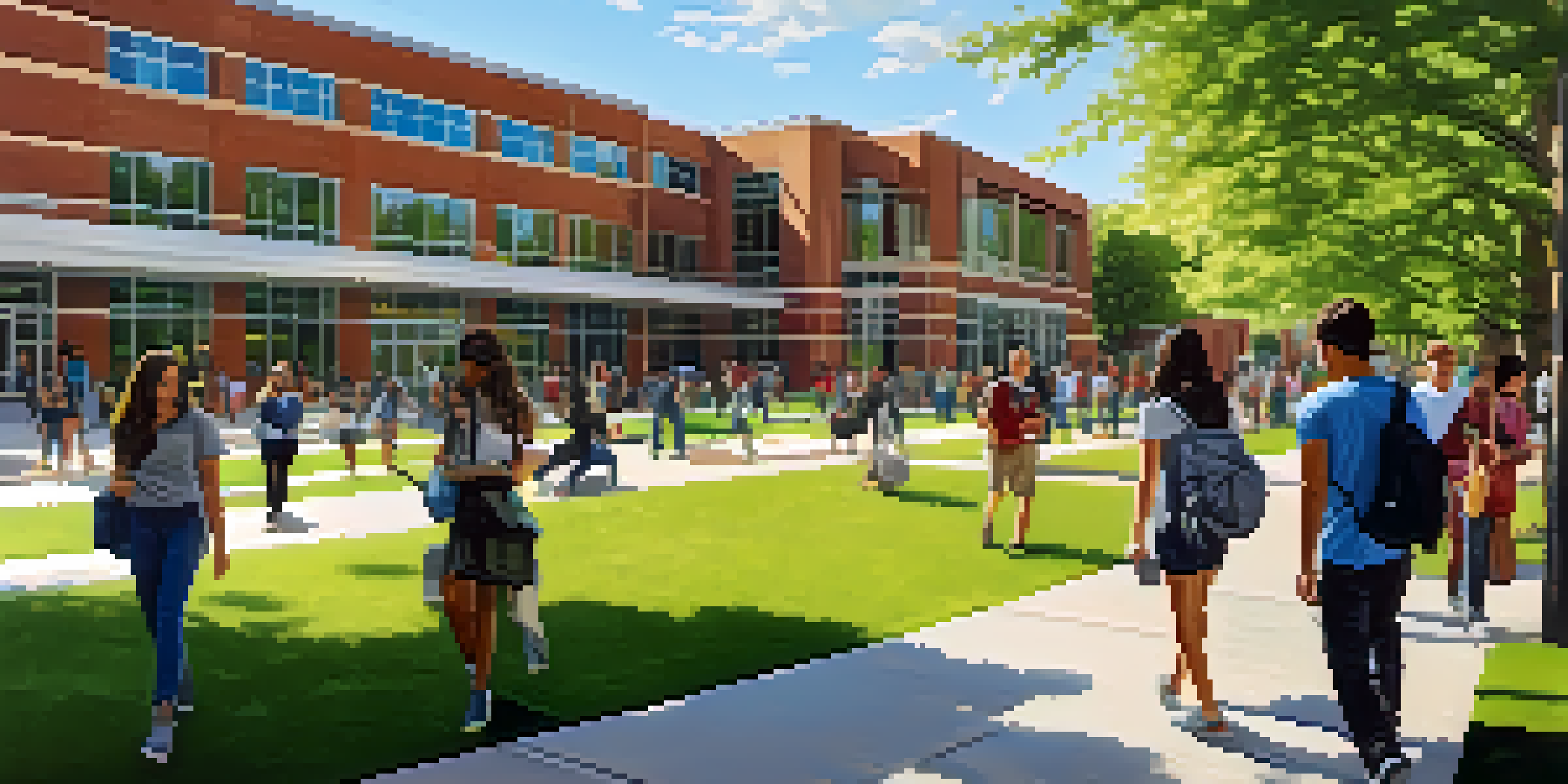The Role of Community Colleges in Kansas Education Landscape

Introduction to Community Colleges in Kansas
Community colleges are a cornerstone of the educational landscape in Kansas, offering accessible and affordable education. These institutions serve a diverse population, including recent high school graduates, working adults, and those looking to retrain for new careers. With 19 community colleges across the state, they provide crucial pathways for many students who seek higher education without the burden of significant debt.
Community colleges are not just a pathway to a degree; they are a bridge to opportunity for many individuals seeking to improve their lives and pursue their dreams.
The mission of community colleges often extends beyond just education; they aim to foster personal and professional growth. This makes them an attractive option for those who may not be ready for a four-year university or who wish to explore various fields before committing to a specific career path. Their flexible course offerings and supportive environments allow students to thrive at their own pace.
Moreover, community colleges often collaborate with local businesses and industries to tailor programs to meet workforce demands. This connection not only enhances the employability of graduates but also helps to stimulate the local economy by preparing a skilled workforce that meets the needs of Kansas employers.
Accessibility and Affordability of Education
One of the defining features of community colleges in Kansas is their commitment to accessibility. They provide opportunities for students from all walks of life, including those who may face financial barriers or personal challenges. Affordable tuition rates and financial aid options make it possible for many to pursue their educational goals without accumulating crippling debt.

In addition to affordability, community colleges often have open enrollment policies, meaning that students can enroll without the competitive admission processes typical of four-year institutions. This welcoming approach encourages individuals who may have been hesitant to pursue higher education due to academic performance in high school.
Accessible Education for All
Community colleges in Kansas provide affordable and open enrollment options, making higher education accessible to a diverse range of students.
Furthermore, many community colleges offer flexible class schedules, including evening and online courses. This adaptability allows students to balance education with work and family commitments, making it easier for them to succeed academically while managing other responsibilities.
Diverse Programs and Career Opportunities
Kansas community colleges offer a wide range of programs, catering to varied interests and career goals. From technical training in fields like healthcare and manufacturing to liberal arts and general education, there's something for everyone. This diversity enables students to explore different pathways and discover their passions before committing to a specific career.
Education is the key to unlocking the world, a passport to freedom.
Many community colleges also provide vocational training that aligns with local industry needs. For example, programs in nursing, information technology, and culinary arts are designed to equip students with the skills required by employers in Kansas. This targeted approach not only benefits students but also strengthens the local economy by ensuring a skilled workforce.
Additionally, community colleges often have partnerships with four-year universities, allowing students to easily transfer credits. This creates a seamless transition for those who wish to pursue a bachelor's degree after completing their associate degree, making higher education more attainable.
Support Services for Student Success
Community colleges prioritize student success by offering robust support services. From academic advising to tutoring and counseling, these resources help students navigate their educational journeys. Such support is particularly beneficial for first-generation college students who may not have a roadmap for success.
Many institutions also provide career services, including job placement assistance and internships, which are invaluable in today's competitive job market. These services help students gain real-world experience and connect with potential employers, enhancing their employability upon graduation.
Workforce Development Focus
These institutions align their programs with local industry needs, ensuring that graduates are equipped with the skills required by Kansas employers.
Moreover, community colleges often foster a sense of community through student organizations and extracurricular activities. These opportunities allow students to develop leadership skills, build networks, and form lasting friendships, contributing to a well-rounded educational experience.
The Impact on Local Economy and Workforce Development
The role of community colleges in Kansas extends beyond education; they significantly impact the local economy. By providing training and education that aligns with workforce needs, these institutions ensure that graduates are prepared to fill jobs in high-demand sectors. This alignment helps to attract businesses to the area, knowing they can find skilled workers.
Moreover, community colleges contribute to the overall economic development of their regions by increasing the educational attainment of the local population. Higher levels of education are linked to higher earning potential, which can lead to increased consumer spending and a stronger local economy.
Additionally, partnerships with local industries often lead to customized training programs that address specific workforce challenges. This collaboration not only helps students gain relevant skills but also ensures that businesses have access to a pool of qualified candidates, fostering economic growth in Kansas.
Challenges Faced by Community Colleges
Despite their many benefits, community colleges in Kansas face several challenges. One significant issue is funding; many institutions rely on state and federal support, which can fluctuate year to year. This uncertainty can impact program offerings and the ability to hire qualified faculty, ultimately affecting the quality of education.
Additionally, community colleges often grapple with student retention rates. While they attract a diverse student body, many students face obstacles that can hinder their academic progress, such as work commitments or family responsibilities. Developing strategies to support these students is essential for improving retention and graduation rates.
Support Services Enhance Success
Robust support services, including academic advising and career assistance, help students navigate their educational journeys and improve retention rates.
Lastly, as online education continues to grow, community colleges must adapt to meet the changing needs of students. Offering more online courses and improving technology infrastructure are necessary steps to stay competitive and provide flexible learning options for all students.
Future Trends in Kansas Community Colleges
Looking ahead, community colleges in Kansas are poised to play an even more critical role in the education landscape. As industries evolve and new technologies emerge, these institutions must remain agile in adapting their programs to meet changing workforce demands. This will require ongoing collaboration with local businesses and a commitment to continuous improvement.
Additionally, there is a growing emphasis on integrating technology into the classroom. Community colleges are increasingly exploring hybrid learning models that combine in-person and online instruction, providing students with greater flexibility and access to resources. This trend will likely continue as more students seek convenient education options.

Lastly, community colleges will need to focus on enhancing their outreach efforts to attract a broader range of students. By promoting the value of a community college education and the opportunities it provides, they can help ensure that everyone in Kansas has access to the resources they need to succeed.